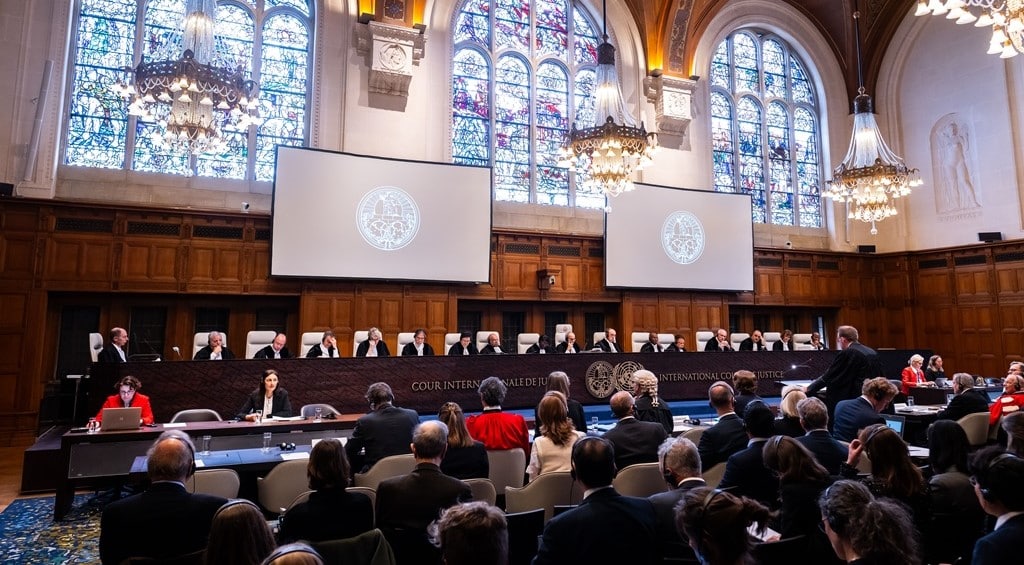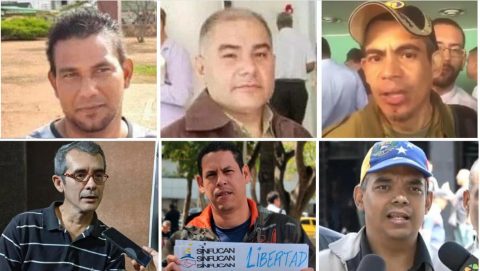8 de agosto 2023

ICJ Rules Against Nicaragua's Request For Germany to Halt Arms Sales to Israel

PUBLICIDAD 1M
PUBLICIDAD 4D
PUBLICIDAD 5D
The sentence given to Blanca, Astudillo, Cortes, Bracho, Melendez and Negrin doesn’t just impact them – it’s projected onto everyone in Venezuela.

Collage of photos taken from Twitter compiled by “Familia S.O.S. Libertad”
Sixteen years in prison. The regime has dictated 16 years in prison for Venezuelan citizens Gabriel Blanco, Nestor Astudillo, Reynaldo Cortes, Alcides Bracho, Alonso Melendez and Emilio Negrin. Sixteen years in prison for making use of rights that are enshrined in our current National Constitution. Sixteen years in prison for opposing government decisions aimed at undermining the salary and benefits of the Venezuelan public employees.
Sixteen years in prison for denouncing the growing impoverishment. Sixteen years for demanding salary raises. Sixteen years for saying that it’s impossible to continue working under the current conditions. Sixteen years in prison for speaking with the fellow workers they represent: for meeting, for resisting, for refusing to accept the open and shameless theft of benefits that are part of their rights.
And who are Blanco, Astudillo, Cortés, Bracho, Meléndez and Negrín? I’ll repeat the obvious: simple Venezuelan citizens. Union leaders. One or two of them, human rights advocates. Several of them, linked to the Bandera Roja [“Red Flag”] political organization. One of them, Emilio Negrin, nothing less than president of the Federation of Court Workers. Very probably, one of more have been sympathetic or close to the regime – workers who believed that Hugo Chavez, truly had a commitment to the poor, or that Nicolas Maduro, “the worker president,” would promote some form of well-being, would respect the essential rights workers have gained, such as the right to organize, to defend oneself, and to air their grievances in the public arena.
Sixteen years in prison. And what crimes have these grassroots leaders been accused of to justify such a brutal, perverse, and totally disproportionate sentence? The crimes they accuse them of are embedded in generic formulas: conspiracy, to begin with, and criminal association as a second. These are the most common, but not the only ones, accusations employed to erase, eradicate, and dissolve the right to protest in Venezuela. It’s clearly the action of a dictatorship capable of exercising limitless forms of violence not tied to any concrete event, but unleashed with the aim of setting an example, teaching a lesson, to the universe of public employees. To make it very clear, impress into every mind, that protest – no matter what the reason – will be punished with this ferocious, pitiless, and senseless penalty – sixteen years in prison. It’s a matter of destroying, without blinking, the principle of labor union freedom. To lead the workers, like the rest of the Venezuelan citizens, into a state of complete defenselessness. Absolute vulnerability.
Sixteen years in prison. And what evidence led Judge Grendy Alejandra Duque Carajal, in her role as presiding judge at the Second Courtroom for Jurisdiction over Terrorism, to dictate such a monstruous sentence? None. No evidence, and sixteen years in prison. Worse yet: sixteen years in prison for a baseless accusation, where the accusing party didn’t even appear in court. Sixteen years for a baseless accusation, without any evidence, with no substance whatsoever. A sentence of sixteen years in jail, as the result of a supposed report from an unknown “cooperating patriot” – a person they never succeeded in locating. In other words, a disappeared witness: evaporated, faceless, voiceless, wordless. A witness? Is that a witness? Someone who doesn’t testify?
And I must insist on this: the sentence of 16 years in prison dictated against Blanco, Astudillo, Cortes, Bracho, Melendez and Negrin doesn’t only impact them: it’s unmistakably projected onto every one of us. It hangs over our lives like a certain, close, and imminent threat.
As we know, the right to protest is guaranteed in Article 68 of Venezuela’s Constitution, with the only requirement being that said protests be peaceful and unarmed. Nothing else. If that’s so, then applying the most elemental legal logic how can you explain that these six Venezuelans have been “tried” by a tribunal dedicated to terrorism (in a country where the only terrorism that exists is that of the state)?
The background of these measures is evident. They’re related to a chain of events that have been steadily worsening for years throughout Venezuela: the constant deterioration of salaries and working conditions; persecution and attacks on grassroots social leaders, unions and associations; massive repression of workers’ protests, including the retired and pensioners; systematic loss of conquests and concessions; an increase in job insecurity, even in the government; politization of job duties (a government employee is obligated to march and demonstrate political loyalty under threat of being fired or finding themselves the object of serious discrimination); the subjection of the workers to the arbitrary actions of the PSUV Party Bosses, to incompetent soldiers, to allies of the narco-guerrilla who flaunt positions in public administration, and to so many in this regime who are enemies of those who aspire only to work and live honorably.
There’s only one point left for me to make: if the cause of Blanco, Astudillo, Cortes, Bracho, Melendez and Negrin doesn’t reach the proportions of a national and international struggle; if it doesn’t succeed in mobilizing the unions in other Latin American countries; if the opposition forces, the groups from civil society, the universities, the labor unions across the country don’t reach an agreement and establish as their objective the liberation of these six Venezuelans, the abhorrent sentence won’t be reversed, and the lives of those men and their families will be damaged forever.
This article was originally published in Spanish in Confidencial and translated by Havana Times.
PUBLICIDAD 3M
Periodista venezolano, presidente y director del periódico El Nacional. Fue vicepresidente del Bloque de Prensa, la asociación de prensa principal de Venezuela.
PUBLICIDAD 3D